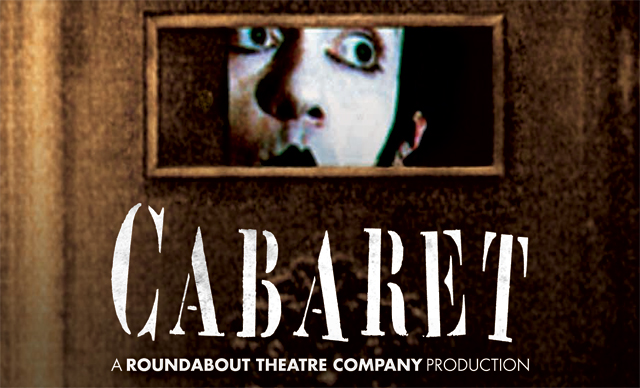
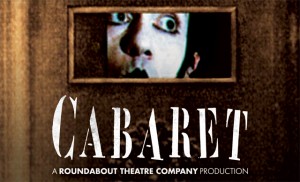 Highly Recommended **** Roundabout Theatre Company’s production of Cabaret, the theatrical adaptation of Joe Masteroff’s book, is one of the darkest musicals that I have ever seen. Human sexuality, abortion, Nazism, and the holocaust are all treated in varying degrees and every subject is given its due gravity: the latter three are never the subject of Jokes. A character called Emcce (Randy Harrison) serves more as a master of ceremonies than a narrator. He is with us at the beginning, during, and at the very end of the play. Emcce stays with us during the story of a writer, Clifford Bradshaw (Lee Aaron Rosen), who arrives in Germany and teaches English lessons, runs increasingly mysterious smuggling operations from Paris to Berlin for his friend Ernst Ludwig (Ned Noyes), and struggles to write a novel. He lives, as writers so often do in artistic mediums, in a boarding house that is run by Fraulein Schneider (Shannon Cochran): a morally reputable spinster with a gorgeous voice, sweet disposition, and admirer-turned surreptitious lover-turned fiancée-Herr Schultz (Mark Nelson). Bradshaw, initially an observer, slowly enters the play’s action, pursuing a love affair of his own with an English girl from the cabaret dancing troupe: Sally Bowles (Andrea Goss) with whom he dreams of starting a life. However, the rise of the Nazism will threaten all their hopes and here there are no mountains in Robert Brill’s sparse and static set over which to climb and escape.
Highly Recommended **** Roundabout Theatre Company’s production of Cabaret, the theatrical adaptation of Joe Masteroff’s book, is one of the darkest musicals that I have ever seen. Human sexuality, abortion, Nazism, and the holocaust are all treated in varying degrees and every subject is given its due gravity: the latter three are never the subject of Jokes. A character called Emcce (Randy Harrison) serves more as a master of ceremonies than a narrator. He is with us at the beginning, during, and at the very end of the play. Emcce stays with us during the story of a writer, Clifford Bradshaw (Lee Aaron Rosen), who arrives in Germany and teaches English lessons, runs increasingly mysterious smuggling operations from Paris to Berlin for his friend Ernst Ludwig (Ned Noyes), and struggles to write a novel. He lives, as writers so often do in artistic mediums, in a boarding house that is run by Fraulein Schneider (Shannon Cochran): a morally reputable spinster with a gorgeous voice, sweet disposition, and admirer-turned surreptitious lover-turned fiancée-Herr Schultz (Mark Nelson). Bradshaw, initially an observer, slowly enters the play’s action, pursuing a love affair of his own with an English girl from the cabaret dancing troupe: Sally Bowles (Andrea Goss) with whom he dreams of starting a life. However, the rise of the Nazism will threaten all their hopes and here there are no mountains in Robert Brill’s sparse and static set over which to climb and escape. 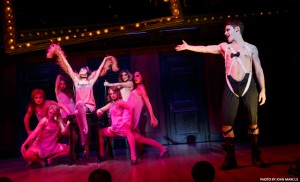
With ample help from makeup and costume designers Robert Amodeo and William Ivey Long, Harrison adroitly conveys a bohemian, metropolitan, entity who deftly transverses nationality, gender, and sexuality: the very antithesis of German Nazism. He is capable of warmth and improvisation, and doesn’t feel the need to ask for acceptance of whatever he happens to be at that particular moment; however, his sometimes demeaning sexual jokes combined with a slight aura of sadomasochism keep Emmce a dark figure even in his funniest moments. Meanwhile, Rosen assumes responsibility for anchoring the play’s gravity with a steady, nervous earnestness that he maintains even when things don’t seem to be going that badly. Nelson remains quietly brave and sweet as Herr Schultz and avoids any Jewish stereotypes, keeping his character “very kind, but very German” (as Tennyson once said of Prince Albert), just as he and the other characters, with the exception of Ludwig, insist that he is. Noyes is solid in his transformation from ever-so-slightly aggressive friend to the play’s chief antagonist in as much as this play has human antagonists at all: the whole thing is far too sinister for that.
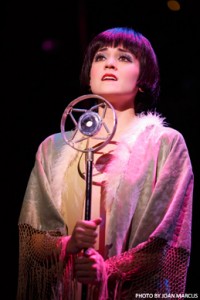 As to the female leads, while Cochrane’s superb musical numbers felt out of character, she really captures the time, place, and culture by the traditional yet warm way she represented her character. She centered the play in 1939 Germany in a way the technical work (Larry Morley) just doesn’t. Goss is feisty and mysterious. By turns, sad and cruel, and perhaps the plays one enigma. Like the other actors she handled her character well. However, although this musical is extremely impactful overall, there are times when it didn’t feel like it was coming off quite as well as it should. Director Sam Mendes let the actors’ performances pull the play in different directions by allowing them to create characters who were just too different to be thrust together.
As to the female leads, while Cochrane’s superb musical numbers felt out of character, she really captures the time, place, and culture by the traditional yet warm way she represented her character. She centered the play in 1939 Germany in a way the technical work (Larry Morley) just doesn’t. Goss is feisty and mysterious. By turns, sad and cruel, and perhaps the plays one enigma. Like the other actors she handled her character well. However, although this musical is extremely impactful overall, there are times when it didn’t feel like it was coming off quite as well as it should. Director Sam Mendes let the actors’ performances pull the play in different directions by allowing them to create characters who were just too different to be thrust together.
This was all the more noticeable by the superb coordination of the dance and musical pieces (Choreography: Rob Marshall and Cynthia Onrubia). By contrast, the lighting (Peggy Einshauer and Mike Baldassari) was confusing as sometimes it was projected on the audience rather than the stage, leaving one to wonder if it was even intentional. Most importantly, the eerie and shocking last scene could have been drawn out a bit more to produce a larger impact and to resolve any confusion about what had happened and why, literally and symbolically, and make us more fully reflect on the character of emmce with whom we had become almost personally acquainted but who had hitherto had been tangential to the plot. Nonetheless, this play boasts some of the best music (John Kander and Fred Ebb) and dance that I’ve heard of late, and is innovative in its dark thematic elements and ambience, leaving one feeling deeply unnerved at its end which makes it unique and highly satisfying musical theatre.
Cabaret is playing through February 21st at The PrivateBank Theatre *ocated at 18 West Monroe Street. It runs through Sunday February 21st with performances Tuesdays, Wensdays, Thursday, Friday and Sundays at 7:30 pm, and Saturday’s at 8:00 pm. There are additional 2:00 pm matinees Wednesdays, Saturdays, and Sundays. Tickets range from $25 to 108$ A Select Number of Premium Tickets are available for many performances. Group tickets for 10 or more are available by calling Broadway in Chicago Group Sales at (312)-997-1710. Tickets are available at all Broadway in Chicago Box Offices (24 W. Randolph St., 151 W. Randolph St., 18 W. Monroe Street and 175 E. Chestnut), the Broadway in Chicago Ticket Line at (800-775-2000) all Ticketmaster retail locations and online at www.BroadwayinChicago.com The plays run for two hours and thirty minutes with one intermission.
To see what others are saying, visit www.theatreinchicago.com, go to Review Round-up and click at “Cabaret”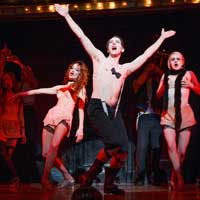
- This is the new name for the theater that was at one time The Shubert, then the LaSalle Bank, followed by The Bank Of America and now, its new name and sponmsorship- The Private
- still on Monroe , between State and Dearborn.






More Stories
“The Music Man”
“The S Paradox” reviewed by Julia W. Rath
“A Year With Frog and Toad”